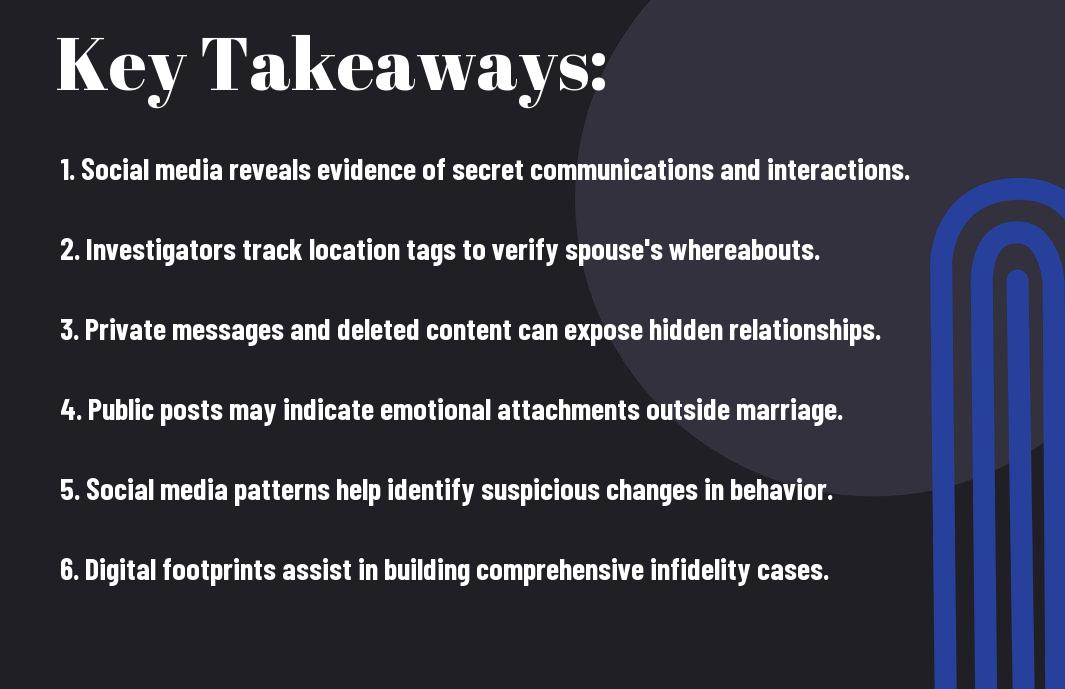There’s no denying that social media has transformed the way we communicate and interact, and this impact extends into infidelity investigations. As you navigate the complexities of trust and betrayal, understanding how social media can serve as both a tool and a source of evidence becomes vital. In this post, you’ll discover how platforms you regularly use can offer insights into relationships and behaviors, aiding in the evaluation of suspicions and providing clarity in uncertain times. Contact Digital Forensic Squad for a customized digital infidelity investigation guide personalized for your case by our specialists.
Key Takeaways:
- Social media platforms often serve as a primary source of evidence in infidelity investigations, revealing interactions and connections that may indicate disloyal behavior.
- The use of social media offers both a challenge and an opportunity for investigators, as the vast amount of information can complicate the ability to discern relevant details from noise.
- Understanding privacy settings and the implications of digital footprints on social media can greatly affect the outcomes of infidelity cases and the strategies employed in investigations.
Understanding Modern Infidelity
The landscape of infidelity has evolved significantly in the digital age. The rise of social media and online communication has created new avenues for emotional and physical betrayal, making it easier for individuals to engage in affairs discreetly. This shift has heightened the complexities surrounding loyalty and trust in relationships.
Definition and Types of Infidelity
After understanding modern infidelity, it’s imperative to classify it. Infidelity can take several forms that may vary based on emotional or physical involvement.
|
Knowing these types of infidelity can help you identify and address issues within your relationships. |
Psychological Aspects of Betrayal
Betrayal can profoundly impact your emotional and psychological well-being. The experience of being unfaithful or discovering a partner’s infidelity brings forth feelings of betrayal, anger, and sadness, which can lead to long-term mental health issues.
In addition to immediate emotional turmoil, betrayal can cause diminished self-esteem and a pervasive sense of distrust in future relationships. Understanding these psychological impacts is vital for healing and rebuilding trust, both in yourself and with your partner.

The Rise of Social Media
It is undeniable that social media has become an integral part of our daily lives, reshaping how we communicate and interact. Platforms such as Facebook, Twitter, and Instagram not only foster connections but also present new challenges for relationships. The ease of sharing personal experiences online can lead to misunderstandings and jealousy in romantic partnerships.
Statistics on Social Media Use
For many, social media is now a primary form of communication, with studies indicating that approximately 70% of adults in the U.S. use social networking sites regularly. This significant engagement highlights how deeply entrenched social media has become in everyday interactions, affecting personal and professional relationships alike.
Impact on Relationships
Between social media platforms and instant messaging applications, your relationship may face challenges that weren’t as prevalent in the past. The constant connectivity can lead to increased scrutiny and insecurity, as partners may analyze each other’s online interactions for signs of infidelity or discontent.
This heightened level of access to one another’s lives can create a breeding ground for suspicion and conflict. Social media allows you to see what your partner is doing at any given moment, potentially triggering feelings of jealousy or inadequacy. Furthermore, being able to communicate with past partners or engage with new acquaintances online can blur the lines of loyalty and commitment, placing additional strain on your relationship.

Tools for Investigation
All modern investigations into infidelity rely on various tools to uncover the truth. These tools range from digital forensics to social media monitoring, providing investigators with vital information. Utilizing technology effectively allows you to gather evidence and gain insights into potentially suspicious behavior, ultimately helping you navigate complex personal situations.
Social Media Platforms as Evidence
To research deeper into infidelity cases, social media platforms serve as significant sources of evidence. You can investigate your partner’s online activity, examining posts, messages, and interactions that may reveal troubling patterns or relationships that go beyond friendship.
Digital Footprints and Traces
Across various online platforms, individuals leave digital footprints that can be pivotal in investigations. By analyzing these traces, you can uncover details about your partner’s online behavior, including sites visited, search history, and communication with others.
It’s necessary to recognize that digital footprints encompass more than just social media activity. They also include browser history, app usage, and online subscriptions, all of which can provide insights into your partner’s interests and interactions. By understanding how to access and interpret these digital traces, you can piece together a clearer picture of their online life, helping you make informed decisions in your investigation.
Ethical Considerations
For anyone involved in infidelity investigations, ethical considerations are paramount. You must navigate the delicate balance between uncovering the truth and respecting the individuals’ rights and privacy. Understanding these ethical boundaries can help you maintain integrity throughout your process, ensuring that your actions are not only effective but also responsible.
Privacy Concerns
Among the numerous ethical dilemmas, privacy concerns stand out. You could be tempted to probe into someone’s social media profiles, but it’s crucial to consider the implications of such actions. You need to respect personal boundaries and ensure that your investigation does not violate an individual’s right to privacy.
Legal Implications
Behind every infidelity investigation lies a web of legal implications. You must be aware that certain surveillance techniques or data collection methods could breach laws, leading to serious consequences for you and your client. Missteps in this area could result in legal actions, including lawsuits for invasion of privacy.
Due to the complexity of digital privacy laws and regulations, it’s vital for you to familiarize yourself with the legal landscape pertaining to social media investigations. This includes understanding specific laws that govern data collection, consent, and user rights. Engaging with a legal expert can equip you with the knowledge necessary to navigate these matters, helping you avoid potential pitfalls that could undermine your case or lead to unwanted legal repercussions.
Case Studies
Not all infidelity cases are the same, but social media plays a significant role in many investigations. Here are some notable patterns from various studies:
- 57% of infidelity cases linked social media activity to suspicious behavior.
- 65% of discovered affairs were facilitated by platforms like Facebook and Instagram.
- 40% of investigators reported finding incriminating messages or photographs.
- 75% of respondents admitted to monitoring their partner’s social media without their knowledge.
- 82% of parties that engaged in infidelity used private messaging apps.
Successful Investigations
Case studies illustrate that utilizing social media evidence can lead to successful infidelity investigations. In one instance, a private investigator uncovered an affair after discovering suspicious interactions on Instagram, ultimately helping the client find closure in a troubling relationship.
Misinterpretations and Pitfalls
By analyzing social media, you may come across misconstrued interactions that raise doubts. Without context, innocent posts can appear suspicious.
Studies show that many individuals misinterpret friendly exchanges or moments shared online, mistaking them for signs of infidelity. This can lead to unnecessary anxiety and conflict between partners, ultimately eroding trust. Using social media evidence requires careful consideration of context, as innocent interactions can be easily misrepresented, causing you to jump to conclusions that may not reflect the reality of your relationship. Accuracy in interpretation is key to navigating these complex emotional waters.
Best Practices for Conducting Investigations
Now that you understand the complexities of infidelity investigations, it’s important to establish best practices to ensure accurate and effective results. Begin by setting clear objectives, maintaining thorough documentation, and respecting legal boundaries throughout your inquiry. This disciplined approach will not only enhance the validity of your findings but also instill confidence in your investigation process.
Strategies for Evidence Collection
The collection of evidence should be systematic and methodical. Utilize a variety of sources, including digital communications, social media profiles, and location tracking, while ensuring compliance with privacy laws. Organize your findings for easy access and cross-reference them against your primary objectives to maintain clarity and focus during your investigation.
Collaborating with Professionals
Evidence suggests that working with experienced professionals significantly enhances the outcome of your investigation. Engaging private investigators or legal experts provides you with valuable insights and resources that might be beyond your reach. They can assist in gathering evidence effectively while ensuring adherence to applicable laws and ethical practices.
With the right professionals by your side, your investigation can benefit from their expertise and skills. These experts can offer advanced techniques in digital forensics or surveillance that you might not possess. Furthermore, their understanding of legal protocols can help protect your rights and ensure that any evidence collected is admissible in court, should the need arise. Collaborating with seasoned professionals not only maximizes your chances of achieving a successful resolution but also provides peace of mind during what can be an emotionally taxing process.
To wrap up
From above, it’s clear that social media plays a pivotal role in modern infidelity investigations. You can leverage various platforms to gather evidence, track behavior, and ultimately understand your partner’s actions. By utilizing available tools and being mindful of privacy concerns, you enhance your investigative capabilities. This knowledge empowers you to make informed decisions about your relationship based on reliable, concrete information rather than speculation. Staying aware of your surroundings in the digital landscape can be your ally in navigating complex emotional situations.
Q: How has social media changed the landscape of infidelity investigations?
A: Social media platforms have become significant tools in infidelity investigations due to their ability to provide real-time information and insights into personal interactions. Investigators can analyze posted content, likes, comments, and private messages to gather evidence of potentially unfaithful behavior. The visibility that social platforms offer often leads to discovering hidden relationships or emotional attachments that might not be apparent through traditional investigation methods.
Q: What type of social media evidence is most commonly used in infidelity cases?
A: Evidence from social media that is frequently utilized in infidelity cases includes direct messages, photos, check-ins at locations, and posts that suggest intimate or romantic connections between individuals. Additionally, interactions such as likes and comments on each other’s posts can serve as indicators of a close relationship. Investigators often compile this information to build a comprehensive overview of the individual’s online behavior and relationships.
Resources
1. Use of social network websites in investigations

